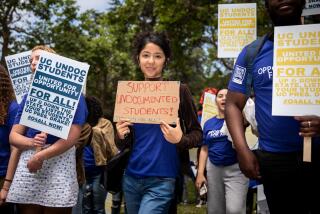Villaraigosa backs boycott of Arizona
Blasting Arizona’s tough new immigration law as “unpatriotic and unconstitutional,” Los Angeles Mayor Antonio Villaraigosa on Thursday backed a boycott of the state and urged Southern Californians to join an immigrant and labor rights march this weekend that police say could swell to 100,000 participants.
“The debate has caused a call to action,” Villaraigosa said.
Organizers of the May Day march, scheduled for Saturday morning in downtown Los Angeles, say that the outcry over the Arizona law and the slow pace of congressional action on immigration reform have prompted renewed activism. The law, set to take effect in midsummer, makes it a state crime for illegal migrants to be in Arizona, requires police to check for legal status and prohibits people from hiring day laborers off the street.
Meanwhile, many immigrant-rights activists say they are losing patience with the Obama administration and Congress for not pressing comprehensive legislation that would legalize the nation’s 11 million illegal immigrants and allow more family visas in addition to beefing up border enforcement. Although Sen. Charles Schumer (D-N.Y.) unveiled a 26-page “conceptual proposal” for a bill Thursday, activists remain dismayed that he continues to postpone introducing actual legislation.
The combination of those events — along with fear that several immigrant-friendly Democrats will suffer political defeat in November — has pushed the alarm button for many activists. For the first time since 2006, several immigrant rights coalitions have put aside their differences and are unifying behind a single march this year.
“Absent our unity, immigration reform will always be put off to another day,” said Angelica Salas of the Coalition for Humane Immigrant Rights of Los Angeles. “We need to show a powerful force that we won’t give up on immigration reform in 2010.”
Salas said the Spanish-language media, which helped fuel a massive turnout of more than 500,000 marchers in 2006, have closely covered the Arizona law and are helping publicize Saturday’s march.
The Korean community has also been galvanized, said Eun Sook Lee, executive director of the National Korean American Service and Education Consortium in Los Angeles. She said her center has received numerous phone calls from Koreans wanting to sign up for bus trips to Arizona to protest the law and to participate in the march. Several hundred are expected to turn out, including as many as 100 Korean drummers in colorful folk garb.
“Many people who may have been ambivalent in the past are outraged,” Lee said. “This has sparked a national outcry.”
Los Angeles Police Chief Charlie Beck said his department is expecting tens of thousands of participants in Saturday’s rally but also a peaceful event.
“We have estimates as high as 100,000,” he said. “That is a reasonable estimate. We are prepared to police that effectively.”
Beck stressed that his officers would be guided by Special Order 40, the department’s long-standing policy that prohibits officers from initiating contact with anyone for the sole purpose of determining whether they are in the country illegally.
At his news conference Thursday, Villaraigosa urged people to march with white shirts, U.S. flags and trash bags in a peaceful demonstration of immigrants’ desires to work and participate in U.S. civic life.
Marchers will begin gathering at 10 a.m. at Olympic Boulevard and Broadway and will walk north on Broadway to City Hall. In addition to the downtown march, police are preparing for small gatherings in MacArthur Park and Westwood.
Planning for this year’s march has been in the works for months, police said. With a tight budget the department had to ensure that a massive number of officers were available to work the May 1 rally. In this year’s planning, march organizers and other groups have expressed concern about how the LAPD will approach the marchers, among whom would be illegal immigrants.
Times staff writer Andrew Blankstein contributed to this report.
More to Read
Sign up for Essential California
The most important California stories and recommendations in your inbox every morning.
You may occasionally receive promotional content from the Los Angeles Times.












